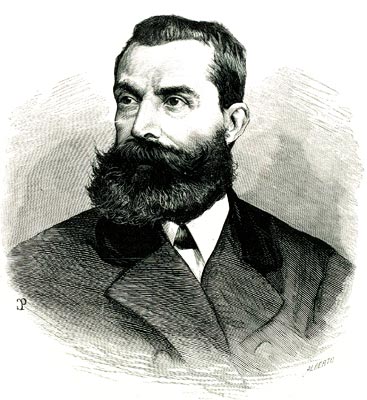<Back to Index>
- Chemist Otto Hahn, 1879
- Poet João de Deus Ramos, 1830
- President of the Hellenic Republic Konstantinos Karamanlis, 1907

João de Deus Ramos (March 8, 1830 – January 11, 1896), better known as João de Deus, the greatest Portuguese poet of his generation, was born in Silves, São Bartolomeu de Messines, in the province of Algarve, son of Pedro José Ramos and wife Isabel Gertrudes Martins. Matriculating in the faculty of law at the University of Coimbra, he did not proceed to his degree but settled in the city, dedicating himself wholly to the composition of verses, which circulated among professors and undergraduates in manuscript copies.
In the volume of his art, as in the conduct of life, he practised a rigorous self-control. He printed nothing previous to 1855, and the first of his poems to appear in a separate form was A Lata, in 1860. In 1862 he left Coimbra for Beja, where he was appointed editor of O Bejense, the chief newspaper in the province of Alentejo, and four years later he edited the Folha do Sul. As the pungent satirical verses entitled Eleições prove, he was not an ardent politician, and, though he was returned as deputy for the constituency of Silves on April 5, 1868, he acted independently of all political parties and when general elections were called the following year, he did not seek renewal of his mandate. The renunciation implied in the act, which cut him off from all advancement, is in accord with nearly all that is known of his lofty character. In the year of his election as deputy, his friend José António Garcia Blanco collected from local journals the series of poems, Flores do campo, which is supplemented by the Ramo de flores (1869). This is João de Deus' masterpiece.
He married Guilhermina das Mercês Battaglia, born in Lisbon on July 12, 1849, daughter of António Battaglia, of Italian descent, and wife Maria Madalena Soares, and had two sons.
As an indication of a strong spiritual reaction three prose fragments (1873) Anna, Mãe de Maria, A Virgem Maria and A Mulher do Levita de Ephraim translated from Darboy's Femmes de la Bible, are full of significance. The Folhas soltas (1876) is a collection of verse in the manner of Flores do campo, brilliantly effective and exquisitely refined. Within the next few years the writer turned his attention to educational problems, and in his Cartilha maternal (1876) first expressed the conclusions to which his study of Pestalozzi and Fröbel had led him. This patriotic, pedagogical apostolate was a misfortune for Portuguese literature; his educational mission absorbed João de Deus completely, and is responsible for numerous controversial letters, for a translation of Theodore-Henri Barraus' treatise, Des devoirs des enfants envers leurs parents, for a prosodic dictionary, and for many other publications of no literary value. A copy of verses in António Vieira's Grinalda de Maria (1877), the Loas da Virgem (1878) and the Provérbios de Salomão are evidence of a complete return to orthodoxy during the poet's last years.
By a lamentable error of judgment, some worthless pornographic verses entitled Cryptinas have been inserted in the completest edition of João de Deus' poems -- Campo de Flores (Lisbon, 1893). He died in Lisbon on January 11, 1896, was accorded a public funeral and was buried in the National Pantheon, the Jeronymite church at Belém, where repose the remains of Camões, Herculano and Garrett. His scattered minor prose writings and correspondence have been posthumously published by Teófilo Braga (Lisbon, 1898).